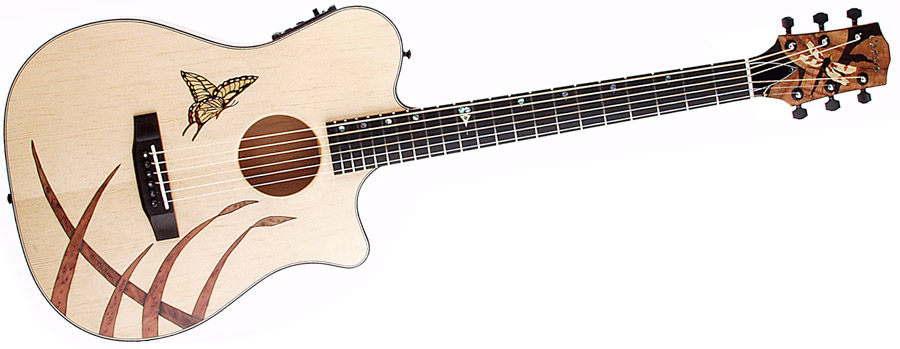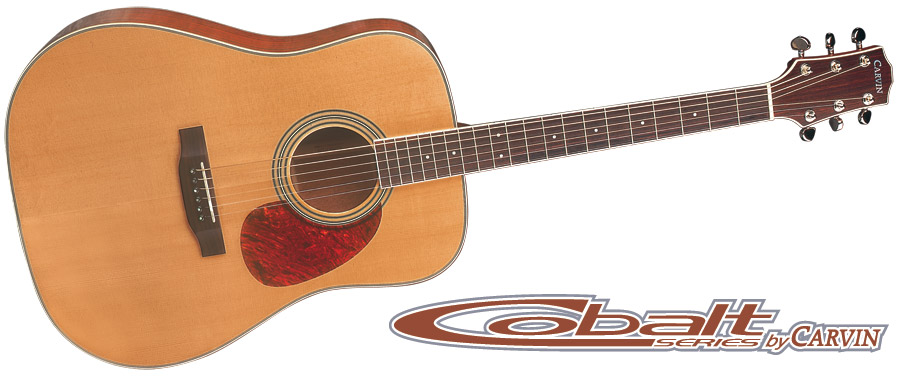
The popular Bolt was unchanged, and used the same photos from 1999, laid onto the new background. The price increased slightly, to $499 for the hardtail model, but dropped slightly to $539 for the Bolt-T, with Wilkinson tremolo.
The DC127 and DC135 were unchanged for 2001, but benefited from the available twinblades and Fishman acoustic bridge. The prices achieved parity, with both models now selling for $599, or $639 with the Wilkinson tremolo, or $679 with the Floyd Rose tremolo.
The TL60 rose slightly in price, to $589 for the hardtail model, and $629 for the TL60T with Wilkinson tremolo. The Charlie Crowe Option Package, which included Harlequin Prismatique finish, body binding, reverse matching headstock and dual humbuckers rose to an additional $300 over the base TL60 price.
Like other models, the SC90 was unchanged, but the prices rose slightly, to $599, while the SC90T with Wilkinson tremolo was $639, and the SC90C, with Floyd Rose tremolo, $679.
The DC200 and DC400 were unchanged, but got new catalog photos, once again showing the DC200, and relegating the DC120 12-string to an inset photo. The DC200 rose slightly, to a base price of $699, and the DC400 dropped, to a base price of $899. The Wilkinson and Floyd Rose equipped models dropped slightly on both models. The DC120 remained $749. The DC400 Anniversary model, which was a highly upgraded DC400, with 5-piece maple/koa neck, flamed maple top and matching headstock, and 3 piece alder/koa/flamed maple (or Claro Walnut) body was still available as a $200 upgrade to the DC400, DC400T or DC400C.
The 7-string DC727 and DC747 guitars were unchanged for 2001. The prices remained the same at $629 for the DC727, and dropped to $659 for the DC747.
Allan Holdsworth's signature single-pickup H1 and HF1 were retired, leaving the dual pickup H2 and HF2 models (although the single pickup versions could be custom ordered). Base prices remained the same, at $799 for the H2, and $899 for the HF2.
In the semi-hollow/acoustic arena, the AC175 and AC275 remained unchanged, although the prices increased to $669 for the AC175, $719 for the AC275, and $779 for the AC275-12. The same catalog photo was used as in 2000. The AC375 was also unchanged, but it's base price rose to $839, plus $118 for the HC16 hardshell case. The CL450 classical was unchanged from it's introduction in 2000. Base price on the CL450 increased to $879.
The last of the Collector's Series was introduced at the beginning of 2001. This was the Catfish AE185, created in
conjunction with marquetry artist T. Breeze VerDant. This model was made with California Claro Walnut (top), Honduras
Mahogany (body & neck), Ebony (fretboard). Additionally, the inlays were made from Hawaiian koa, bubinga, satinwood,
macassar ebony, rosewood, tulipwood, koto, mahogany, boxwood, paua abalone, and gold mother of pearl. As with the other
Collector's Series models, only 10 of these were made, at a cost of $6100, including tweed hardshell case and certificate of
authenticity. The AC375 Swallowtail was the only non-AE185 instrument created for the Collector's Series, at a cost of $4650. Breeze
made himself a prototype Swallowtail (below) with a spruce top, versus flamed koa.

In 2001, Carvin tried something totally new, the Cobalt Series of acoustic guitars. Unlike Carvin's Custom Shop guitars and basses,
these instruments were made overseas, and did not have the long list of options available. Essentially, they were mass-produced,
off-the-shelf type instruments, but were sold at a very attractive price, and were comparable to other import acoustics on the market.
However, unlike other imported acoustics, the Custom Shop inspected and set-up each instrument, providing the same exacting quality
control as the USA-made guitars. Standard features on all models was Grover tuners, mahogany neck, bound rosewood fingerboard and
headstock with inlayed Carvin logo, ebony bridge pins with abalone inlays, Tusq saddle and Elixir NanoWeb strings. The Cobalt C550 had a
AA spruce top, rosewood back and sides, satin finish and gloss body with abalone soundhole purfling. Price on this was $499. The C250 was
slightly smaller than the C550, with all the same features. It sold for $419. The C250S (below) was the same as the C250, but with an
AA cedar top. It sold for $419, also. The C350 had gloss mahogany top, sides and back, with satin mahogany neck, and sold
for $429. The C750 was an acoustic/electric single-cutaway model, with Fishman Matrix pickup and Fishman Prefix Plus electronics,
with an AA spruce top and mahogany body. It sold for $549. The C850 had the same features of the C750, with rosewood back and sides, and sold for $629.

The new P-Series bass upgrade added 18V electronics with a piezo bridge saddles and additional controls, allowing standard electric basses to somewhat emulate the tone of an acoustic bass. The P-Series package included the 18V electronics, piezo bridge, HB2 bridge pickup and rounded body sides. The upgrade was available on all models except for the LB20 and B4/B5 bolt-neck basses. In keeping with the tradition of offering freebies and specials, Carvin offered 50% off all options and cases with any Custom Shop order. Because of this, you could actually get a mid-level LB70 for less in 2002 than you could in 1990 (see the 1990 page), as well as similar deals on other models of guitars and basses.
Carvin's Bolt B4 and B5 basses continued to go strong, and provided a high quality, USA-made, entry-level bass at a great price. And like Carvin's top of the line basses, these were available in over 50 different combinations of colors and woods, unlike pretty much any other bass on the market, where 4 or 5 color/wood choices are the norm. Combined with the various electronic, hardware, fretless, headstock and other options, there were hundreds of different combinations possible. The B4 was priced at $499, and the B5 was priced at $629.
The passive LB20 and active LB70, Carvin's mainstay four-stringers, remained the same in 2001. These also featured the many finish, wood, electronic and other options as the rest of the line, and the LB70 was also available with the "P" option, that included piezo pickups on the bridge saddles, rounded body sides, and 18V active electronics with an HB2 Alnico and J99 pickups. The LB20 was priced at $589, and the LB70 was priced at $659. The LB70P was priced at $809. Like the other models from 2001, the LB75 and LB76 remained unchanged, and were available with the "P" option, as well as all the combinations of colors, woods, etc.
Carvin's LB70, LB75 and LB76 continued to be available in the Claro Walnut Series. The body is constructed from a walnut back, with a thin maple center, and California Claro walnut top, making for a "wood binding" type of effect. Round body edges are standard, as is a 5-piece neck. The new "P" option was available on all of them. The Anniversary Series was similar to the Claro Walnut Series, but with an alder back, walnut center, and highly figured flamed maple top. This model was available in all LB Series basses, and has the same features and functionality as the Claro Walnut Series. The base price on the LB70W/A was $1139, and $1289 for the "P" option. The LB75W/A was $1199, and $1359 for the "P" option, and the LB76W/A was $1299, or $1449 for the "P" option.
New for 2001 was a six-string model of the highly successful Bunny Brunel Series of basses called the BB76 (below) - however,
due to space limitations, it wasn't shown in the catalog. The BB70 and BB75 remained unchanged. The BB70 was $749,
and $899 for the "P" option. The BB75 was $819, and $969 for the "P" option. The BB76 was $919, and $1069 for the "P" option.

Carvin continued it's tradition of being one of very, very few mainstream bass manufacturers to offer a high quality, USA-made acoustic bass. Although most major bass manufacturers produce acoustic basses, these are generally imports, and lack the high quality and features of the AC40 and AC50, such as neck-through design, mahogany body and standard AAA Engleman spruce top. The AC40 was priced at $699, and the AC50 was priced at $769.